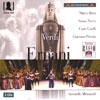Verdi Ernani
An opera of youth, for youth, but there’s a twist in this tale
View record and artist detailsRecord and Artist Details
Composer or Director: Giuseppe Verdi
Genre:
Opera
Label: Dynamic
Magazine Review Date: 9/2006
Media Format: CD or Download
Media Runtime: 121
Mastering:
Stereo
DDD
Catalogue Number: CDS496/1-2

Tracks:
| Composition | Artist Credit |
|---|---|
| Ernani |
Giuseppe Verdi, Composer
Alessandro Svab, Jago, Bass Antonello Allemandi, Conductor Carlo Guelfi, Don Carlo, Baritone Giacomo Prestia, De Silva, Bass Giuseppe Verdi, Composer Marco Berti, Ernani, Tenor Nicoletta Zanini, Giovanna, Soprano Parma Teatro Regio Chorus Parma Teatro Regio Orchestra Samuele Simoncini, Don Riccardo, Tenor Susan Neves, Elvira, Soprano |
Author: John Steane
Changing CDs between Acts 2 and 3, I came ruefully and prematurely to conclude that Ernani is an opera for youth. All that speed and noise, all those passions demanding instant and violent solutions. After the Prelude the tempi are predominantly fast. Two short passages of repose – the lovers’ uncharacteristic resort to the mode of Donizettian love-birds (‘Ah! morir potessi adesso’) and Carlo’s potentially exquisite ‘Vieni meco’ – intervene in a score of generally unremitting turbulence. It’s the young Verdi writing for his own turbulent generation.
But then Act 3 brings us to the tomb of Charlemagne: the orchestral largo strikes a more reflective mood, with hints of Don Carlos and Otello hidden in the womb of time. Carlo settles to his meditations in ‘O de’ verd’ anni miei’ and the act ends with the inspired ‘O sommo Carlo’. At the heart of Act 4 is the trio ‘Solingo, errante, misero’, which touches sublimity. So if they can keep pace with the first two acts, the old folk will find that Ernani can accommodate them too. But not, I think, in this performance. Age also has some experience, in the course of which it will have acquired standards in the singing of such operas. You don’t have to go back to Battistini, De Luca and Stracciari (though it helps) to realise that there are better ways of singing the baritone’s music than with the uneven, ill-schooled (though well endowed) tones of Carlo Guelfi. Similarly with the other male roles. Ernani’s characteristic mode is emphatic and declamatory but that does not justify the graceless methods of Marco Berti. The bass Giacomo Prestis is acclaimed after his aria as though he were Christoff, Pinza and Mardones all in one; but, as recorded, the sonority of his large voice is vitiated by incipient wobble.
The Elvira, Susan Neves, deserves better company: she has the right kind of voice for the role, singing with feeling, technical accomplishment and sometimes with real beauty. Choral and orchestral work is admirable throughout, with Antonello Allemandi driving hard, rhythmic energy his priority.
While there is no ideal recording, the catalogue offers plentiful choice of viable alternatives. Bonynge’s joyful account, with Pavarotti imaginative and in fine voice, Sutherland a little past her best, is my current favourite. The 1967 Metropolitan cast of Price, Bergonzi and Sereni under Schippers is a good runner-up, with the English National Opera version under David Parry (Alan Opie an excellent Carlo) fully competitive. I would not add Muti’s prestigious Scala recording (EMI, 12/85R) to the list, the singers being under too rigid a discipline, with little allowance made for imagination or personal feeling.
But then Act 3 brings us to the tomb of Charlemagne: the orchestral largo strikes a more reflective mood, with hints of Don Carlos and Otello hidden in the womb of time. Carlo settles to his meditations in ‘O de’ verd’ anni miei’ and the act ends with the inspired ‘O sommo Carlo’. At the heart of Act 4 is the trio ‘Solingo, errante, misero’, which touches sublimity. So if they can keep pace with the first two acts, the old folk will find that Ernani can accommodate them too. But not, I think, in this performance. Age also has some experience, in the course of which it will have acquired standards in the singing of such operas. You don’t have to go back to Battistini, De Luca and Stracciari (though it helps) to realise that there are better ways of singing the baritone’s music than with the uneven, ill-schooled (though well endowed) tones of Carlo Guelfi. Similarly with the other male roles. Ernani’s characteristic mode is emphatic and declamatory but that does not justify the graceless methods of Marco Berti. The bass Giacomo Prestis is acclaimed after his aria as though he were Christoff, Pinza and Mardones all in one; but, as recorded, the sonority of his large voice is vitiated by incipient wobble.
The Elvira, Susan Neves, deserves better company: she has the right kind of voice for the role, singing with feeling, technical accomplishment and sometimes with real beauty. Choral and orchestral work is admirable throughout, with Antonello Allemandi driving hard, rhythmic energy his priority.
While there is no ideal recording, the catalogue offers plentiful choice of viable alternatives. Bonynge’s joyful account, with Pavarotti imaginative and in fine voice, Sutherland a little past her best, is my current favourite. The 1967 Metropolitan cast of Price, Bergonzi and Sereni under Schippers is a good runner-up, with the English National Opera version under David Parry (Alan Opie an excellent Carlo) fully competitive. I would not add Muti’s prestigious Scala recording (EMI, 12/85R) to the list, the singers being under too rigid a discipline, with little allowance made for imagination or personal feeling.
Discover the world's largest classical music catalogue with Presto Music.

Gramophone Digital Club
- Digital Edition
- Digital Archive
- Reviews Database
- Full website access
From £8.75 / month
Subscribe
Gramophone Full Club
- Print Edition
- Digital Edition
- Digital Archive
- Reviews Database
- Full website access
From £11.00 / month
Subscribe
If you are a library, university or other organisation that would be interested in an institutional subscription to Gramophone please click here for further information.




